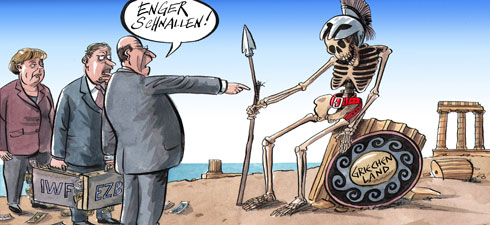With the political agreement in Athens and the Eurogroup meeting yesterday (February 9) the discussions on the Greek debt have taken a step forward, however, the solution remains, as always, on the razor’s edge. The February 15 deadline is the whip, one hears; for after the deadline a disorderly default, dangerous for the entire euro zone, will be unavoidable.
It will not be easy to firm up the Greek government’s commitments over time to the new austerity measures, the procedures for dispensing the European subsidies, and the “voluntary” reduction of the public debt. The responsibilities of Greece are obvious. But there serious flaws too in the way the European Union has handled the crisis.
Following 2009, the Greeks were asked to make adjustments that were too rushed to be correctly implemented or politically and socially palatable. More care should have been taken in preparing the structural reforms and in bringing them in on a more realistic schedule.
The necessary funding should have been secured, including for projects specifically oriented at growth, without allowing interest rates on new public debt securities to reach the levels we have seen.
Justifying a certain European arrogance by the fact that the Greeks had cheated on the accounts was the preferred attitude: it gave the impression that Greece’s importance to the European Union was down only to the risk of contagion it posed to the finances of “more important” countries.
The Commission behaved like a notary
Europe should have worked harder – on the communication and image fronts as well – to increase the potential of Greece and help its people to grasp and accept the reforms.The European authorities have also allowed much misunderstanding and confusion to be sown around several aspects of the crisis. First, they failed to cut down on the excessive number of negotiators that the Greeks had to parley with.
The Commission has behaved as a notary; a complex body of bilateral aid has given way to the particulars of different national governments; the heads of the French and German governments, in particular, have played lone riders, alternating demands and threats and playing hide-and-seek with procedures and deadlines.
The European Central Bank has been asked to step improperly into the shoes of governments to ensure medium- and long-term funding; the IMF also has been called in to the rescue, sparking much controversy by giving the idea that without Washington Europe has no money and no competence for dealing with the Greek problem.
The official aid was considered privileged credits, which had the effect of increasing the risks taken by private creditors, but left the negotiations of private lobbyists for the “voluntary” restructuring of the debt confusedly superimposed on the relationship between the Greek authorities and those of the EU.
More confusion has grown up around the question of a Greek default. First, the subject has been completely excluded, demonstrating contempt for the markets, which in demanding higher rates are showing they consider it possible. The intent was to prevent the panic from spreading to the debt of other countries.
But to rule out all notion of bankruptcy implies a bail-out guarantee, which was not intended; and so in fact it has not been possible to avoid the contagion. Then negotiations with private creditors were favoured, in the context of a declaration of partial and voluntary default, with assurances – it is unclear on what basis – that this would be an absolutely exceptional measure..
Confusion between bankruptcy and leaving the euro
Meanwhile serious blunders in the accounting rules for sovereign debt in banks' balance sheets have emerged: we have gone from very permissive stress tests, which saw almost all government securities as non-depreciables, to an obligation to evaluate them at knock-down prices imposed by the market.
Following which we are now unsure whether the real problem is the solvency of the Greek government, or the solvency of the creditor banks. The idea of accelerating the adoption of a valid procedure for all parties for renegotiating the public debt without delay when it becomes unbearable – that is to say, before the vicious cycle of debt and the interest it generates can speed up – in an orderly and fair manner, in order to avoid panic and contagion, has not been considered.
It has even been claimed that such a procedure would make the risk of contagion more likely. Yet the absence of such a procedure will not prevent – once the Greek puzzle is resolved, one way or another – another puzzle from cropping up, for example in Portugal.
There’s also – more the fault of many economists than of the European authorities – the confusion between bankruptcy and an exit from the eurozone. While a well-controlled default actually reduces a nation’s debt, leaving the eurozone would lead to brutal write-downs, which would be neutralised immediately by inflation and the marginalisation of that country by the international markets.
When it gets repeated with some insistence that the eurozone is too patchy and that Greece should not be in it, it would be well to consider how things might have played out had the EU managed to avoid both disorder and confusion.
Was this article useful? If so we are delighted!
It is freely available because we believe that the right to free and independent information is essential for democracy. But this right is not guaranteed forever, and independence comes at a cost. We need your support in order to continue publishing independent, multilingual news for all Europeans.
Discover our subscription offers and their exclusive benefits and become a member of our community now!












